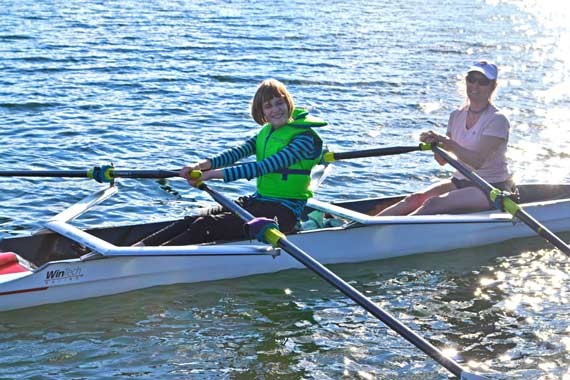The Northwest Arm is bustling with activity on a hot summer's night. Sailboats, motor boats and rowing racing shells travel up and down the water.
"I really like the freedom that I feel when I row. It's lovely to look out on the water and also feel very powerful when I'm making the boat move," says Meredith Bullock, 15, after getting out of a racing shell at the Halifax Rowing Club.
Bullock is the newest athlete in the para-rowing program at the Halifax Rowing Club. It's not the first sport Bullock has tried, but it's been the best fit. She's only been on the water for a month. Before that, she trained with an ergometer on land to assess abilities and learn the pattern of rowing.
"I haven't had a whole lot of luck with adaptive sports. I've tried a lot of things and often time they're too adapted and the instructors don't teach you a lot of the actual theory," says Bullock, who has cerebral palsy. The condition affects her fine motor skills—movement in the wrists, hands, fingers, feet and toes—and her gross motor skills that control larger body movements.
She goes out on the water of the Northwest Arm twice a week and receives one-on-one training from volunteer coach Katherine Harman, an associate professor of physiotherapy at Dalhousie University and Rowing Canada's para coach of the year in 2013.
Para-rowing includes athletes with a wide range of physical and intellectual disabilities. When someone joins the program Harman has to adapt to deal with each ddisability.
"Our approach is to try and make the first encounter as comfortable as possible," says Harman.
A potential new athlete goes down to the water when it's not busy, to get a feel for things, and and then they start on a rowing machine. "When someone has a physical disability, often their stroke is a little bit different or they are less able to balance the boat so we put them in a wider boat," says Harman.
Harman is also an international classifier, one of 22 people in the world—she can assess and place athletes in one of three para-rowing classes, each based on what parts of the body you use to propel the boat.
Recently, para-rowing has received international attention, debuting at the 2008 Summer Paralympics in Beijing, China. The Halifax Rowing Cub has had the para-rowing program for nine years, getting its start with a grant from the provincial government to purchase specialized boats. Since then, it has grown to partner with North Star Rowing Club in Dartmouth and has received funding from the government, Rowing Canada and private donations.
Many athletes quickly find success in the para-rowing program. Unlike able-bodied national teams where you need to start training from a young age, an athlete can learn to row and be at the national level in a year. Harman says they'd like to have more people try out the program, including athletes from other sports who have had career-ending injuries.
"You can be a very good athlete if you think of yourself as being in the [para] world instead of the able-bodied world. It's a hard place to go to in your head," says Harman.
As for Bullock, she's setting her own goals for the future. "I want to hopefully at some point move into a single [boat] and row on my own," she says "It's just something that a lot of disabled people haven't done."
Introduction to para-rowing
August 20, 6-8pm
North Star Rowing Club, Lake Banook
northstarrowing.ca

